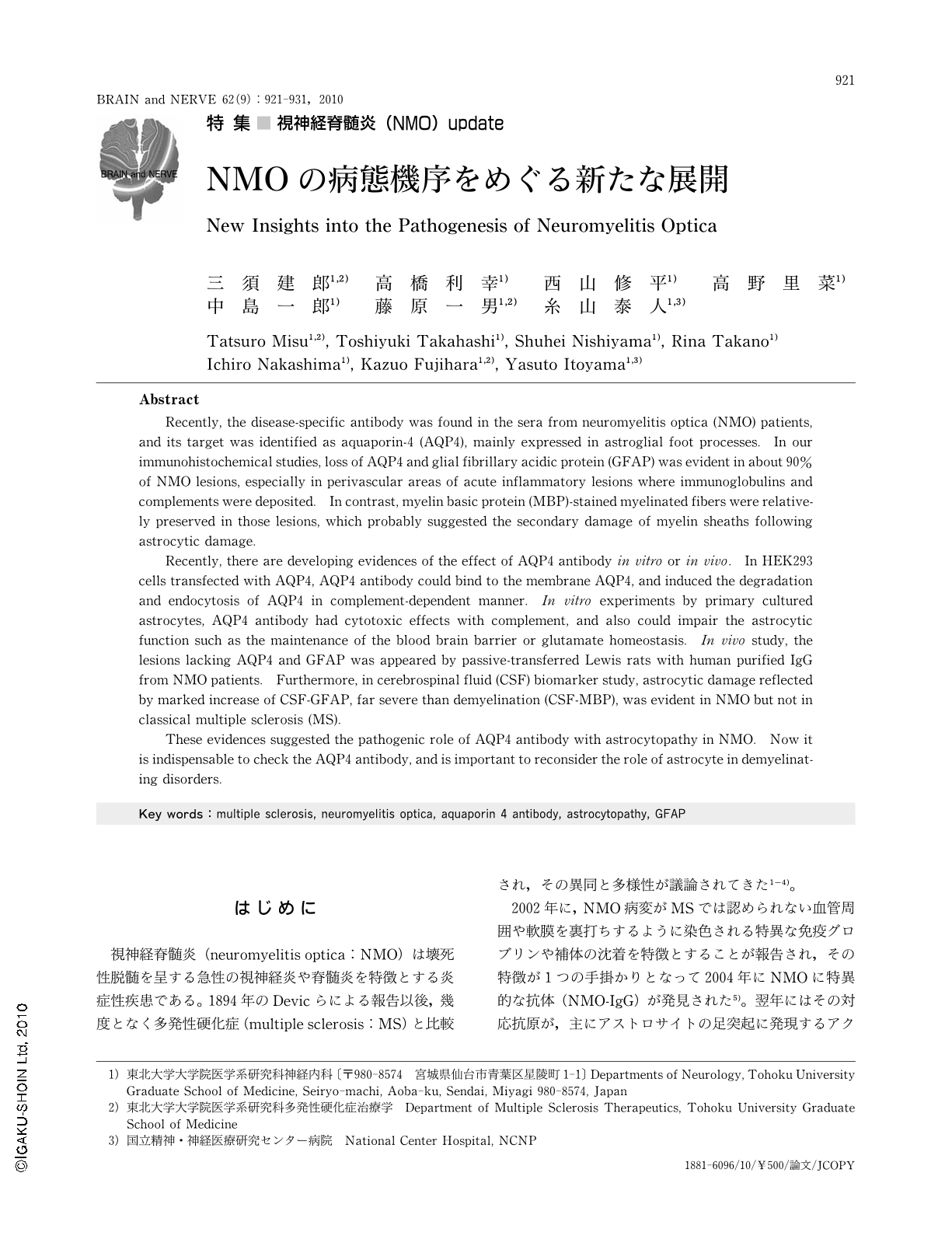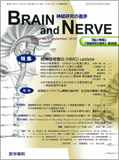Japanese
English
- 有料閲覧
- Abstract 文献概要
- 1ページ目 Look Inside
- 参考文献 Reference
はじめに
視神経脊髄炎(neuromyelitis optica:NMO)は壊死性脱髄を呈する急性の視神経炎や脊髄炎を特徴とする炎症性疾患である。1894年のDevicらによる報告以後,幾度となく多発性硬化症(multiple sclerosis:MS)と比較され,その異同と多様性が議論されてきた1-4)。
2002年に,NMO病変がMSでは認められない血管周囲や軟膜を裏打ちするように染色される特異な免疫グロブリンや補体の沈着を特徴とすることが報告され,その特徴が1つの手掛かりとなって2004年にNMOに特異的な抗体(NMO-IgG)が発見された5)。翌年にはその対応抗原が,主にアストロサイトの足突起に発現するアクアポリン4(AQP4)であることが判明し,両者は異なる疾患であることが示唆された6,7)。NMOで液性因子の重要性が注目されたことで,NMOやMSで相次いでB細胞に対する単クローン抗体であるリツキシマブ(rituximab:抗CD20抗体)の治験が行われ,両者ともに劇的な再発予防効果があることが判明した8,9)。このことにより,MSでも改めて病理学的に液性因子の重要性が議論されている10)。このように近年のMSやNMOの病態研究は,いわば車の両輪のように進んでいるともいえる。
ここ数年の急速な発展により,NMOの病態は主にアストロサイトの足突起に局在するAQP4に対する自己抗体や補体を介したアストロサイトパチーであることが,病理学的検討や数々のin vivoやin vitroの実験的研究により証明されてきており11-13),AQP4抗体が病原性を有する抗体であることは,もはや疑い得ない状況である14-17)。臨床的には,アストロサイト障害の程度がどの程度重症度や予後に反映されるのかを,髄液中GFAP(glial fibrillary acidic protein)を測定することで判断できることがわかってきている。実際に,AQP4抗体がどのようにアストロサイトの細胞表面のAQP4を認識し病態に関与するのか,そういった分子レベルの病態機序も徐々に明らかにされてきている。さらに近年では,脱髄機序を根本的にアストロサイトに求めるといった,より大きな議論が出てきていることも興味深く,脱髄機序におけるアストロサイトの関与が今後注目される。
本稿では,AQP4抗体の発見以後,病理学的研究に始まりin vitroやin vivoにおけるAQP4抗体の病原性を証明する実験的研究に至るまでの免疫病態に関する議論を中心に,現在のNMOの病態機序をめぐる動きについて述べることとする。
Abstract
Recently, the disease-specific antibody was found in the sera from neuromyelitis optica (NMO) patients, and its target was identified as aquaporin-4 (AQP4), mainly expressed in astroglial foot processes. In our immunohistochemical studies, loss of AQP4 and glial fibrillary acidic protein (GFAP) was evident in about 90% of NMO lesions, especially in perivascular areas of acute inflammatory lesions where immunoglobulins and complements were deposited. In contrast, myelin basic protein (MBP)-stained myelinated fibers were relatively preserved in those lesions, which probably suggested the secondary damage of myelin sheaths following astrocytic damage.
Recently, there are developing evidences of the effect of AQP4 antibody in vitro or in vivo. In HEK293 cells transfected with AQP4, AQP4 antibody could bind to the membrane AQP4, and induced the degradation and endocytosis of AQP4 in complement-dependent manner. In vitro experiments by primary cultured astrocytes, AQP4 antibody had cytotoxic effects with complement, and also could impair the astrocytic function such as the maintenance of the blood brain barrier or glutamate homeostasis. In vivo study, the lesions lacking AQP4 and GFAP was appeared by passive-transferred Lewis rats with human purified IgG from NMO patients. Furthermore, in cerebrospinal fluid (CSF) biomarker study, astrocytic damage reflected by marked increase of CSF-GFAP, far severe than demyelination (CSF-MBP), was evident in NMO but not in classical multiple sclerosis (MS).
These evidences suggested the pathogenic role of AQP4 antibody with astrocytopathy in NMO. Now it is indispensable to check the AQP4 antibody,and is important to reconsider the role of astrocyte in demyelinating disorders.

Copyright © 2010, Igaku-Shoin Ltd. All rights reserved.


